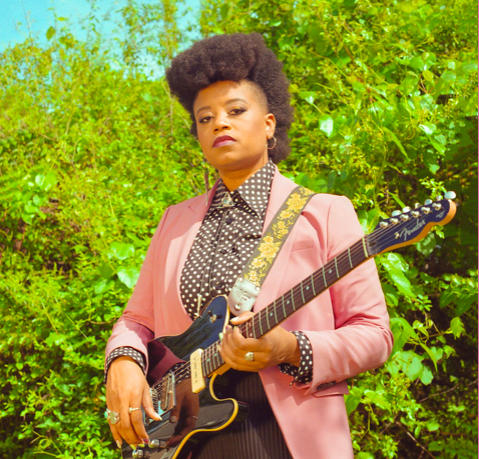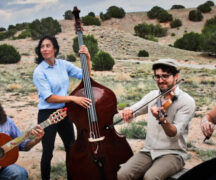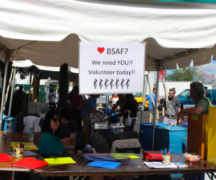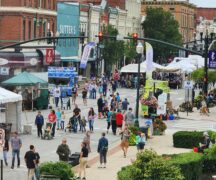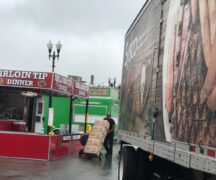Black Swamp Arts Festival Saturday music preview
By DAVID DUPONT
BG Independent News
If the Americana music label hadn’t already existed, then it would have had to be created for singer-songwriter Amythyst Kiah.
A daughter of Appalachia, she’s studied roots and traditional music, and she’s performed with Our Native Daughters. The solo music she’s pursued since then is alternative rock with all the pop and roots music she’s encountered since her childhood woven in.
That sound blossoms out of a life shaped by Appalachia into songs rich with soul and spiritual connection to place.
Kiah will perform at 8 p.m. Saturday, Sept. 9, on the Main Stage of the Black Swamp Arts Festival. The festival runs from Sept. 8 at 5 p.m. through Sept. 10 at 5 p.m. Click for details.
Kiah’s passion for her native region comes through on “Empire Love,” a new song that she’s been working into her setlists. Kiah collaborated on writing it with Sean McConnell.
She sings: “I pledge allegiance to my soul. I follow where she needs to go. I’m a pilgrim for the Empire Love.”
It’s a plea to set aside the “us against them” mentality. “We’re living in a world together,” she said.
That natural world is where Kiah draws her spiritual sustenance.
She was born and grew up in southern Appalachia, and still lives there, in Johnson City, Tennessee, where she and her fiancée recently bought a house.
“That song touches on my love of where I was born and raised and the spiritual connection I have with where I grew up and the kind of safety I feel when I’m home in the mountains,” she said. “While I’m not affiliated with any religion in particular, the natural world and my appreciation of that is for me a spiritual experience.”
But if growing up in Appalachia summons certain stereotypes, Kiah, 36, doesn’t fit them. That’s the theme of her hit “Black Myself.”
A Black woman , she grew up in suburbia, she said. She heard the eclectic mix of music her parents loved o dance to coming out of her audiophile father’s stereo system. From him, she said, she developed a critical ear. She started playing guitar at 13 and listening to the “big voices” of the time, including Michael Jackson and Mariah Carey.
When Kiah started skateboarding, her preferences turned to the punk and alternative rock associated with that scene. And when she enrolled in a classical guitar class “that further altered the way I listened to music,” she said.Now Bjork and Radiohead were on the playlist.
She spent time downloading music on her computer. A friend loaned Kiah a VHS tape of Tori Amos performing. “One night I was up late in my room. I put the VHS in and watched it,” Kiah said. “It just really, really spoke to me. She was such a powerful force in her ability to create thought provoking emotional music.”
The teenaged Amythyst also was inspired by the realization that she could do this at home with her guitar, and using the classical techniques, she was able to create arrangements.
That sparked her desire to write her own songs.
Through all this, she said, “I didn’t think of myself as Appalachian until I started taking Appalachian studies courses. … Honestly, it’s funny but it took college for me to see where I fit in the world and discover my sense of identity.”
When she and her father moved to Johnson City, she started attending East Tennessee State. She wanted to study music, but classical music was too rules-bound. The school had a program in old time music. She reached out to a faculty member concerned about how much theory and music reading she’d need. He laughed and assured her that the music was learned by ear. So, she took a bluegrass guitar class.
This sent her down the rabbit hole “getting to learn about the history, the origins of American music, and seeing how multifaceted and how much a hybrid it is,” Kiah said.
“All these American music genres we know today are really just culminations of European and West African folk music influences… I realized all the music I listened to growing up is part of that family tree of American roots music.”
After a few performances, Kiah, who said she’s naturally shy, started seeing this as a profession, not a hobby.
She was heavy into the old-time music scene. With Rhiannon Giddens, Leyla McCalla, and Allison Russell in Our Native Sisters, she asserted the role of people of color in the music. She put this to music in her most popular song “Black Myself.”
Kiah recorded her own solo version on her 2022 breakout album on Rounder “Wary + Strange,” which puts her songwriting and arranging talents to the forefront.
Her songwriting had taken a back seat. “Playing music is a way to process the way I’m feeling,” Kiah said. “I was dealing with personal struggles with anxiety and insecurity … just dealing with so many different emotions. That included the trauma of losing her mother to suicide when Kiah was 17. She later dealt with the loss in “Wild Turkey,” a song packed with wrenching emotional and riveting musical details.
“It felt safer for a while to just sing other people’s songs I wouldn’t have to vocalize how I’m feeling.”
But she missed singing her own songs. The breakthrough came in 2016, when she started therapy. “I realized that there were unresolved issues and trauma that I wasn’t really facing,” she said. “Once I went through that process, it was OK examining my own feelings, unpacking all of that and being able to write music to express those feelings.”
It’s odd, she said, to have her professional career tied up with such personal expressions. But music that threaded that line was the music that had always attracted her.
Kiah knew though that she had to find a way to compose songs, and not rely on the inspiration of emotional distress. She collects melodies and lyrics on her phone. Then she goes into the studio and kneads those ideas into song using Garage Band software. She can overdub her string instruments – she’s bought an electric bass – and drum tracks to flesh out demos of the pieces.
“That’s been a lot of fun.” Kiah said. “Her exploration into the craft of song writing “”It has now turned into a full-blown interest in the entire crafting of a song, not just melody and chord structure or what I am playing, but how other instruments can interact with one another to add to the song. … This gives me an opportunity to get my feet wet in producing.”
At Rounders’ urging, she’s also started collaborating with other songwriters, such as McConnell. Working with people who have more experience in the business has been rewarding, she said.
At this point, Kiah feels “the world is my oyster.”
“The most rewarding thing is during meet-and-greets when people say the same thing about my music that I used to say about Tori Amos’ music,” she said. “It’s my way of giving back to the universe. I can only hope it helps other people.”
Saturday’s line up
Kiah’s set comes before New Orleans’ legends The Dirty Dozen Brass Band. Since is founding in 1977, the band has injected new life into the New Orleans brass band tradition by bringing funk, soul, and jazz flavors to the traditional sound.
Here’s music in store Saturday at the Black Swamp Arts Festival:
Main Stage
- Mike Williams on Sax, noon
- The AntiVillains, original alt-folk from Toledo, 1:30 p.m.
- Full Cord, bluegrass from western Michigan featuring BG native Grant Flick, 3 p.m.
- Buffalo Nichols, blues performer who brings the field holler century field holler into the 21st century, 4:30 p.m.
- Yam Yam, jam band featuring high energy psychedelic sounds, 6:15 p.m.
- Amythyst Kiah, 8 p.m.
- The Dirty Dozen Brass Band, 10 p.m.
Community Stage
- The Evan Palermo Group, 11 a.m.
- Tree No Leaves, noon.
- Tom Gorman, continuing his string of performing at every Black Swamp Arts Festival, 1:15 p.m.
- Falcon Samba Bateria, 2:30 p.m.
- Sarah and Savina (from The AntiVillains), 3:45 p.m.
- Mike Williams on Sax, 5 p.m.
Family Stage
- Beats on the Street, 10 a.m.
- Falcon Samba Bateria, 12:30 p.m.
- Buffalo Nichols, 2 p.m.
- Mike Williams on Sax, 3:30 p.m.
- Full Cord, 5 p.m.

